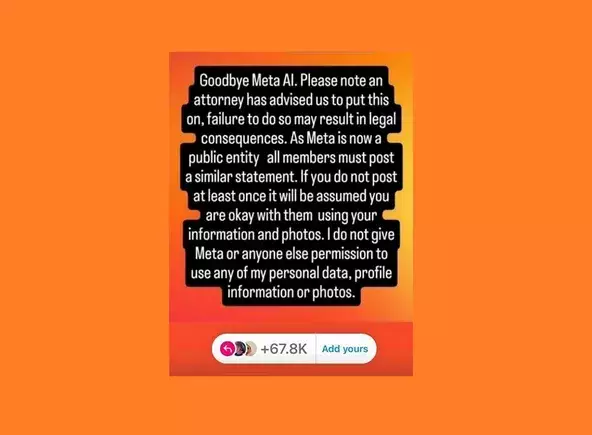In an age where information is available at our fingertips, one would assume that the general public is well-informed about their digital rights and the implications of their online actions. However, the recent trend of sharing legal disclaimers on social media platforms proves otherwise. Many users believe they can safeguard their rights simply by posting an innocuous image or message on their Instagram stories, completely misunderstanding the gravity of what these actions mean in the legal context.
The fact remains that sharing a social media post does not equate to a binding legal notice. This phenomenon can be likened to a small child shouting “I don’t want to go to bed!” as a means of avoiding bedtime; it holds no authority and ultimately, nothing changes. The digital realm is dominated by terms of service agreements, which individuals often agree to without a second thought. Therein lies a complex web of permissions that users grant to platforms like Meta, and these agreements typically include the potential use of public content for various corporate purposes, including AI training.
The Role of Public Content in AI Training
When Meta announced its intention to utilize user-generated content to train its artificial intelligence systems, it inadvertently reignited a conversation about digital privacy and user rights. The platform has made it clear that any content shared publicly is subject to this usage. As a user, ticking that ‘I agree’ box means you are consenting to such practices. For the vast majority, this fact goes unnoticed until the opportunity arises to voice discontent, often in the form of viral social media posts about how individuals can “protect” their content.
What is alarming is that even when users see celebrities sharing these posts, they may blindly adopt the same stance without understanding that these are mere gestures devoid of legal effect. The narrative propagated by social media can create false confidence leading individuals to believe they can outsmart complex legal frameworks through catchy tags and hashtags, which is unequivocally false.
As this trend continues to proliferate amongst users, a critical issue surfaces: the consequence of such misguided beliefs about social media’s transformative ability. Users posting disclaimers about their content being used by Meta serve only as engagement bait and have become the wet blanket to meaningful discourse on digital rights. Such posts not only fail to enact real change but also reveal a willingness to fall prey to misinformation, marking individuals as potential targets for scams in the digital landscape.
Moreover, while users in the European Union have access to mechanisms like the “Right to Object,” the majority of users worldwide lack substantial recourse against their data being repurposed for AI training. The blanket message of a social media disclaimer delivers far less than the necessary due diligence individuals must undertake regarding their digital footprints.
The key to authentic empowerment in the digital age lies in education. Instead of engaging in futile social media exercises, users should turn to legitimate resources to educate themselves about their rights. Reading the user agreements and understanding copyright law are foundational steps that can cultivate a more informed user base. Knowledge of policies like the EU’s “Right to Object” is invaluable, especially for those who are passionate about privacy and digital rights.
Additionally, individuals should consider civic engagement by supporting political candidates who advocate for robust data protection legislation. This proactive stance will contribute far more effectively to the discourse around digital rights and platforms than sharing a viral post that serves only to fuel the frenzy of digital noise.
Ultimately, the empowerment of individuals in the digital sphere hinges upon their knowledge and awareness. The false promise of immediate legal protection through social media posts is an illusion. Instead, the responsibility lies with users to actively seek out understanding, to engage in meaningful discourse, and to become stewards of their own digital rights. In a fast-paced world driven by fleeting social media trends, the true impact can only be realized through committed education and genuine awareness of the complexities surrounding digital engagement.


Leave a Reply